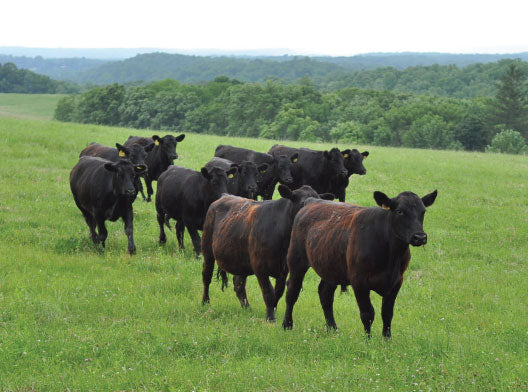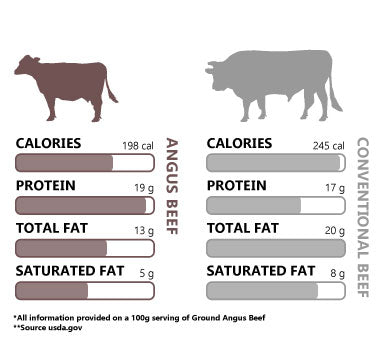
The Aberdeen Angus, sometimes simply called Angus, is a breed of cattle native to Northeastern Scotland. In 1873, George Grant founded the English colony Victoria in the great prairies of Kansas, and brought four Angus bulls to his estate, along with other livestock. No single act had a greater impact on the American cattle industry than this. Grant himself, and other ranchers, began to crossbreed these bulls with native cattle, such as the Texas Longhorn, and countless others in the United States since then, to refine the genetics of the Angus breed that we know and prize today.
On Sustainability:
As leaders in our industry and stewards to the environment, Fossil Farms is committed to the humane raising and handling of our cattle. That’s why we have partnered with small, family owned and operated farms, from Virginia to Vermont, through the Local Harvest Angus Beef program, to source a pasture raised product that's sustainably raised.
Angus cattle generally cause less damage on pasture and require less acreage to graze upon than other cows, however they produce more meat, making them the most sustainable type of beef to consume.
Learn more about the Local Harvest Angus Beef program.
On Nutrition:
While to some, beef is beef, grassfed beef contains different nutritional content than conventionally raised beef. It all comes to down to the environment the cattle is raised in and what their diet is composed of. Having the ability to consume native grasses and seeds across large fields and woodlands enables the cow to live a healthier life, resulting in meat that has significantly less saturated fat and more vitamins, minerals, and antioxidants when compared to conventional beef.

Fossil Farms' Local Harvest Angus Beef:
Raised to the specifications of the “Never Ever Program,” our Angus cattle are never given antibiotics, steroids or hormones. The cattle are grassfed and free to roam on open pastures for a minimum of 100 days before given rations of premium grain to give the meat superior marbling. Our all natural Angus Beef has a vibrant red color and is notably tender.
Fun Facts:
> Within the first 100 years of the American Angus Association being established, 10 million cattle were registered. Farmers preferred this breed because of their ability to survive during harsh winters, ease in rearing calves, and their dark, thick hides, which protect them from getting sunburned.
> Angus Beef hold the largest registry in the world, with the highest numbers on record, both in terms of actual livestock and data on genetics for breeding purposes.
> Because of these large numbers, the sports industry relies heavily on Angus Beef hides to make balls, gloves, and shoes!



